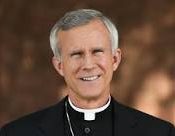Fr. Robert Altier: The Time for Detachment is Now (Audio/Video)
June 15, 2020Neil Gorsuch Helps Transform the Supreme Court Into the Supreme Legislature on LGBT Rights, by H. von Spakovksy & R. T. Anderson
June 16, 2020
By Most Rev. Joseph Strickland, The Wanderer, June 15, 2020
(Republished with permission of Mr. Joe Matt, The Wanderer)
Part 1
 In the aftermath of the tragic and unjust killing of George Floyd, many are using the phrase “social justice.” But what they mean when they use that pregnant phrase may, and often does, vary substantially. Any genuine discussion of authentic social justice, as well as authentic human and civil rights, should consider the great treasury of Catholic Moral Teaching referred to as the Social Teaching of the Catholic Church.
In the aftermath of the tragic and unjust killing of George Floyd, many are using the phrase “social justice.” But what they mean when they use that pregnant phrase may, and often does, vary substantially. Any genuine discussion of authentic social justice, as well as authentic human and civil rights, should consider the great treasury of Catholic Moral Teaching referred to as the Social Teaching of the Catholic Church.
Sadly, there are many misusing Catholic Social Teaching to promote political agendas which are at odds with the truths it presents and proposes. I am convinced that the treasury of insights and principles found within Catholic Social Teaching can indeed help to rescue a Western culture on the brink of an internal collapse.
The problem is finding that treasury, intact, without some form of reinterpretation and/or misinterpretation through a political filter with an agenda too often foreign to the teaching itself. Sadly, too many have taken the principles, criteria for judgment, and guidelines for action which the Social Doctrine offers and used it to promote their own political goals.
What Is The Church’s Social Teaching?
The Catechism of the Catholic Church (n. 2423) summarizes what Catholic Social Teaching offers — and invites us to do — in one line, “The Church’s social teaching proposes principles for reflection; it provides criteria for judgment; it gives guidelines for action.” Prior to 2004, the phrase the Social Teaching of the Catholic Church referred to the teachings found in the Sacred Scriptures (the Bible) and the Christian tradition which were developed and reflected upon within a contemporary series of papal encyclical letters, apostolic letters, and exhortations.
The teaching is called social because it speaks to human society and to the formation, role, and rightful place of social institutions. Many of these truths and principles can be known by all men and women because they are revealed in the Natural Law, accessible by reason, and expounded upon in Revelation. These truths, insights, and principles have been reflected upon by bishops’ conferences and offered to the faithful to apply to their own participation in the social order in the national and cultural environments where they live, work, and serve — as a leaven in the loaf of culture.
These truths, insights, and principles are also informed by the teaching documents of the Second Vatican Council, and other councils preceding it. Most national bishops’ conferences group the Social Teaching around seven themes or topical areas within which these teachings, guidelines, and principles are to be applied. I express these seven areas in my own words below:
1) The fundamental and inviolable Right to Life and Dignity of the Human Person
2) The social call to Family, Community, and Participation
3) Human Rights and Responsibilities as citizens
4) The call to a love of preference to the poor and vulnerable, in all their manifestations
5) The dignity of all human work, which is rooted in the dignity of the worker who does it and the rights and duties of the worker
6) Our obligations in Solidarity — as applied through the principle of Subsidiarity; and
7) Our responsibilities as stewards of the gift of creation.
Where Can One Find The Social Teaching?
The Social Teaching of the Catholic Church is not only for Catholics, other Christians, or even just “religious people.” It is meant for all people and all nations. It is offered by the Catholic Church to those who seek to build a truly just and human society and promote the real common good.
As noted, prior to 2004, the phrase the Social Teaching of the Catholic Church referred to the teachings found in the Sacred Scripture (the Bible) and the Christian tradition which were developed and reflected upon within a contemporary series of papal encyclical letters, apostolic letters, and exhortations.
Unfortunately, many Catholics and other Christians had not read many of these sources — for any number of reasons. Thus, what sometimes is claimed to be the Social Teaching of the Catholic Church was just the spin of self-appointed experts with their own pet political, cultural, social or economic theories, opinions and agendas. I regularly admonish Catholic Christians not to simply accept what someone tells them is Catholic Social Teaching. Even if that someone happens to be an ordained servant of the Church.
Rather, they should personally inform their own minds, hearts, lifestyles, and social participation by the real deal. And, the Church, as mother and teacher, has made that possible. On April 2, 2004, on the Memorial of St. Francis of Paola, Renato Raffaele Cardinal Martino, then president of the Pontifical Council for Justice and Peace, released the Compendium of the Social Doctrine of Church. It contains an impeccably sourced, accessible, and readable summary of centuries of teaching and sets forth the themes of this branch of moral theology called the Social Teaching of the Church.
I strongly suggest that every Catholic home have a paper copy of this resource book right next to their Bible and Catechism. It can be purchased at amazon.com. It is available online at vatican.va. I recommend this Compendium to the many Christians of other communities with whom we should work in social causes.
My greatest disappointment since the publication of the Compendium is how few Catholics and other Christians see the integral connection between the faith they profess and their political, cultural, and social participation.
The fathers of the Second Vatican Council in their Pastoral Constitution on the Church in the Modern World warned, “This split between the faith which many profess and their daily lives deserves to be counted among the more serious errors of our age.”
The Roots Of The Social Teaching
In the first Book of the Hebrew Scriptures, the Book of Genesis, the “Book of the Beginnings,” we find the story of creation, the beginning of the social doctrine of the Church. The Creation story reveals that we were made by the Creator for relationship — with God, with one another, and with the created order.
This is an essential contribution of the Social Teaching. The human being will not find his or her fulfillment or true freedom in isolation. We are constituted for relationships. We form societies not to just somehow “protect” ourselves from the other — but to become who we were created to be. In the words of the sacred text: “It is not good for man to be alone” (Gen. 2:18) Throughout the Hebrew Scriptures we find clear instruction concerning our social relations.
However, for Christians, it is in the great event which forever changed human history — the Incarnation of Jesus Christ, the Word become flesh — that we find the fullness of the truth concerning the human vocation. We also find the invitation to all men and women to find true happiness and human flourishing through a relationship with the Father, in the Son and through the Holy Spirit.
That relationship is to be lived out within the Church, which is the seed of the Kingdom to come, for the sake of the world. It also has implications in how we form social relationships, with all men and women, in the various communities within which we live our daily lives.
The Christian Church proclaims that fullness of humanity is revealed in Jesus Christ, who is true God and True man, the New Adam (See Romans 5:12-20), the One in whom the new creation has begun. Through His Life, Death, Resurrection, and Ascension, Heaven is brought to Earth and Earth is brought to Heaven. Christians are incorporated into Him in and through Baptism and made new.
They are then sent into the world as a part of His Mystical Body, the Church, to continue His redemptive mission. It is in and through His Paschal Mystery, His saving Life, Death, and Resurrection, that we find the deepest meaning of human existence revealed and the path to the fullness of salvation opened to all.
The New Testament is filled with this “Social Teaching.” For example, the Sermon on the Mount (see Matt. 5) contains the very essence of the moral and social teaching of the Christian faith. Jesus Christ, in His Sacred Humanity, is the Social Teaching. It is made visible in its complete perfection in His Sacred Humanity.
How He lived, loved, and related to others is the pattern for all truly human relations. The Church proclaims the truth about Jesus Christ — that He came to redeem the whole person — and to begin a new creation — both of which begin now and will be completed and fulfilled in the resurrection of the body and life in a new Heaven and the new Earth.
Church History And The Tradition
In the history of the early Church we certainly find the development of Christian Social Teaching contained in the writings of the early Church Fathers. It was lived and expressed in the practices of the early Christian communities. The Patristic sources (writings of the early Fathers) evidence a continual stream of teaching to Christians as to how they should properly relate to the goods of the Earth. They were always challenged by their leaders to live simply.
“To possess more than is needed,” St. Basil said, “…is to defraud the poor, to rob them.” Close to the seat of his episcopacy he built a large hospital to care for the sick and the hungry. We see it also in the writings of the great bishop of Constantinople, St. John Chrysostom, in his rich understanding of our social obligations expressed in his phrase the “Gospel of the brother.” This extraordinary bishop was known for multiplying hospitals and setting forth plans for implementing principles of economic justice which included his thoughts on just wages and working conditions.
Contemporary Sources
In the last one hundred or more years, the teaching office of the Catholic Church has developed and updated this beautiful patrimony of social doctrine. Contemporary Catholic Social Teaching is often associated with the promulgation of Pope Leo XIII’s On Capital and Labor (Rerum Novarum) in 1891 and the trajectory of modern papal encyclicals which have been released since.
That includes include the writings of Pope John XXIII, Pope St. Paul VI, and the multiple contributions of Pope St. John Paul II, to whom the Compendium of the Social Teaching is dedicated. It is also enriched by the social Magisterium of Pope Emeritus Benedict XVI. His first two encyclical letters, God is Love (Deus Caritas Est) and Saved by Hope (Spe Salvi), expounded upon the vision of a unity of life which forms the foundation for the Church’s Social Teaching.
In the first, a deeply theological and profoundly spiritual teaching on love, he spends the second half of the letter giving a developed teaching on the demands and implications of social charity. In the second, a reflection on biblical hope, he underscored its social expressions. The message in both is clear — the Gospel has social implications. The Third Installment, an apostolic exhortation entitled The Joy of the Gospel, was not completed by the time Pope Benedict voluntarily stepped aside from the Office of Peter. It was finished by his Successor in office, our current Pope, Francis.
In the Compendium of the Social Teaching, the connection between living faith and authentic social concern is consistent and strong. The message is simple: Christians are called to inform their entire lives, personal, familial, social, cultural, economic, and political, by their faith and thus to live what the Compendium calls “an integral and solidary humanism.”
The Social Teaching of the Catholic Church is meant to inform and influence social, economic, political, and cultural life, primarily through the work of lay Christians who not only know it but have committed themselves to live by it, making it the foundation of their work in service to human society and the common good. This teaching is called “social” because it speaks to human society and to the formation, role and rightful place of social institutions.
It reveals principles and truths that can be known by all men and women – because they are revealed in the natural law. These truths and principles are also confirmed by — and expounded upon in — Revelation. Thus, this body of teaching is not simply “religious,” in the sense that it is intended only for religious persons. It offers insights that are of tremendous value to all men and women — and it offers them for every nation.
The Introduction of the Compendium addresses all men and women with these words: “To the people of our time, our traveling companions, the Church also offers her social doctrine. In fact, when the Church ‘fulfills her mission of proclaiming the Gospel, she bears witness to man, in the name of Christ, to his dignity and his vocation to the communion of persons’.”
The reason for the Social Teaching is to serve the common good. So, what is the common good? We will consider this vital concept in our next installment.





 In the aftermath of the tragic and unjust killing of George Floyd, many are using the phrase “social justice.” But what they mean when they use that pregnant phrase may, and often does, vary substantially. Any genuine discussion of authentic social justice, as well as authentic human and civil rights, should consider the great treasury of Catholic Moral Teaching referred to as the Social Teaching of the Catholic Church.
In the aftermath of the tragic and unjust killing of George Floyd, many are using the phrase “social justice.” But what they mean when they use that pregnant phrase may, and often does, vary substantially. Any genuine discussion of authentic social justice, as well as authentic human and civil rights, should consider the great treasury of Catholic Moral Teaching referred to as the Social Teaching of the Catholic Church.

